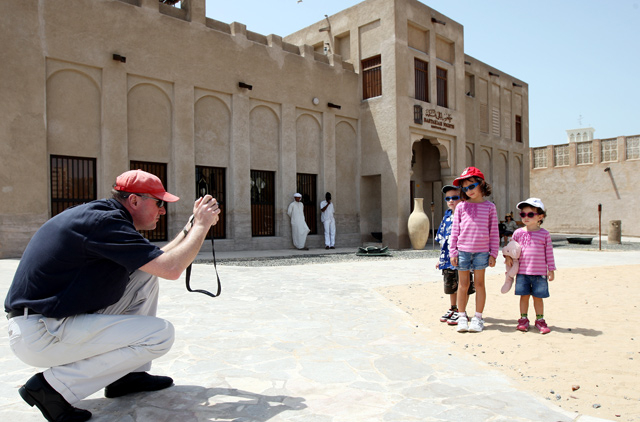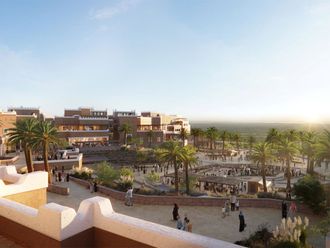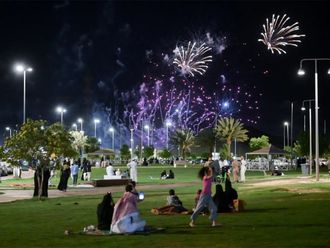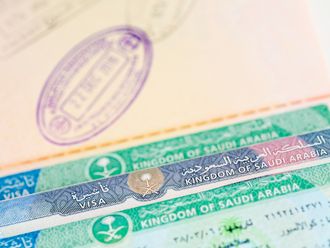Dubai: Since the unification of the UAE’s seven emirates 42 years ago, the UAE has made its mark in the world as a leading tourism destination.
In the last 42 years, the UAE has seen the creation of airlines, such as Emirates and Etihad Airways, airports, a metro station, shopping malls and other major attractions.
“The tourism industry has strengthened greatly, with improving occupancy in Dubai and Abu Dhabi on the back of the expanding network of Etihad Airways and Emirates airline,” Christopher Hewett, senior consultant at TRI Hospitality Consulting, said.
According to data by Dubai Chamber, the UAE’s tourism sector is expected to grow by 6.5 per cent annually between 2011 and 2021.
Once a small trading hub, Dubai has risen to become an international tourism destination for leisure and business travellers “through the infrastructure developed to cater to these markets,” Hewett said.
Dubai is recognised as an entertainment hub, known for its shopping malls and attractions.
Earlier this year, Dubai launched Vision 2020, which involves attracting 20 million visitors to Dubai by 2020, from 10 million visitors in 2012, and tripling the annual contribution made by tourism to the city’s economy.
“We have started out positively on the journey, with a 9.8 per cent increase in visitors during the first nine months of the year, when compared to the same period of last year, having welcomed 7.9 million visitors to Dubai between January and September,” Ahmad Belhoul, CEO of Strategy and Tourism Sector Development at Dubai Department of Tourism and Commerce Marketing, said in an email.
Following the vision, DTCM will focus on positioning and promoting Dubai as a family, event and business destination.
The UAE has become a regional hub for meetings, incentives, conventions and exhibitions, as well as VFR tourism (visiting friends and relatives), says Chiheb Ben-Mahmoud, head of hotels and hospitality for the Middle East and North Africa (Mena) region at Jones Lang LaSalle.
“Sporting events contribute greatly to strengthening the UAE status on the world circuits as a leading international sport tourism destination: Tennis, Golf, Formula 1, as well as Marathon, Cricket, Rugby, Sailing, and more recently Sky Diving,” he said.
Meanwhile, Dubai has seen a number of new hotels open this year to accommodate the growing number of visitors, including The Conrad, Shaikh Zayed Road, The Oberoi Dubai, and Novotel Al Barsha, among others. BY 2015, DTCM expects around 35 additional hotels.
In September, DTCM announced an initiative to incentivise the hotel industry to develop more 3 and 4 star hotels in Dubai by waiving the 10 per cent municipality fee.
Meanwhile, other emirates, including Abu Dhabi, Sharjah, Ras Al Khaimah and Fujairah, are trying to establish an identity, according to Jeff Strachan, general manager of insights Management Consultancy.
Abu Dhabi is trying to become “a capital city”, boasting cultural sites, Strachan said. The emirate will see the opening of Louvre Abu Dhabi in Saadiyat Cultural District in 2015. The site will also be home to Zayed National Museum due to open in 2016.
The emirate is also trying to position itself as a family destination, with the opening of Yas Waterworld, a waterpark, this year.
In addition, the emirate is ramping up its retail offering, with the opening of The Galleria and the World Trade Centre Mall this year, and Yas Mall in 2014.
Abu Dhabi Tourism and Culture Authority (TCA Abu Dhabi) has been working over the years on promoting Abu Dhabi as a tourism destination.
“We are on-track to achieve our hotel guest target of 2.5 million for 2013 which would represent growth of 10 per cent. This has been achieved through our efforts to communicate that there is much more to see and do in Abu Dhabi, and our continued efforts to deliver world-class cultural, sporting and entertainment events,” Mohammed Al Dhaheri, director of strategy and policy at TCA Abu Dhabi, told Gulf News in an email.
Commenting on milestones achieved this year, Al Dhaheri said TCA Abu Dhabi launched the Abu Dhabi Convention Bureau, which was established to drive its business tourism ambitions.
“The Bureau, working closely with stakeholders, has gone on to secure some major convention wins including next November’s hosting, on Saadiyat Island of the DRV annual congress — the summit of the German travel industry. DRV is the umbrella association of the world’s largest outbound market for foreign travel,” he said.
Another milestone is the establishment of an Industry Development Committee to serve the cruise sector, which Abu Dhabi is hoping to develop. The committee will meet every month to discuss challenges and opportunities in the industry.
India is Abu Dhabi’s largest overseas market, with 121,763 Indians staying at the emirate’s hotels in the first nine months of the year, followed by the UK and Germany.
Meanwhile, the northern emirates of Fujairah and Ras Al Khaimah are positioning themselves as centres for heritage and culture, while Sharjah is becoming a religious and cultural destination.
Strachan said that “it will take time” for the emirates to establish their identities as they will need higher volumes of visitors.













